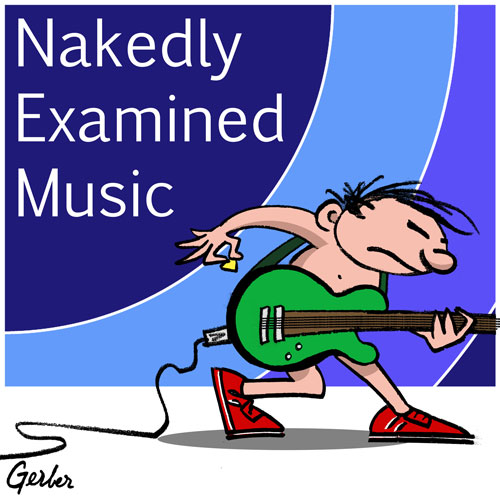
I’m Mark Linsenmayer, the host of The Partially Examined Life Philosophy Podcast, and I’d like to introduce you to a new-in-2016 interview series called Nakedly Examined Music (iTunes — Facebook — RSS) that features great songwriters talking about their motivations and techniques regarding specific songs.
In episode one, for instance, indie rock icon and activist for artist rights David Lowery deconstructed the lyrics for his story songs “All Her Favorite Fruit” (Camper Van Beethoven, 1989) and “I Sold the Arabs the Moon” (from his 2011 solo album), contrasting these with the nonsense song that launched his career, “Take the Skinheads Bowling.”
The songs discussed are played in full, and the idea is to get a sense of the artist’s approach in very specific terms, and how this has changed over time. In episode 15, Craig Wedren shows us his development from writing heavy (“post-hardcore”), dissonant music in the 90s with Shudder to Think, to creating disco synthscapes with his early 00’s band Baby, to now composing music for soundtracks like Netflix’s “Wet Hot American Summer: First Day of Camp.”
The emphasis in a given interview depends on the artist: Guitar virtuoso Gary Lucas (Captain Beefheart, Jeff Buckley) eschews music theory, so the focus is more on the ideology of creation, whereas tap-guitar wizard Trey Gunn (King Crimson, David Sylvian) instructs us in combining time signatures and soloing in modes. The interviews both teach us how to listen to and appreciate music by showing us what to focus on, and also serve to instruct songwriters real and vicarious about decisions that go into a choice of chord or lyric or instrumentation.
What kind of music can you expect to hear? Officially, anything that has thought behind it, but I’m starting with my experience as musician (see www.marklint.com) and music lover growing up in the 80s and 90s listening to popular, indie, folk, punk, and progressive rock. There hare been some movement into soul (Episode 16 features the great Narada Michael Walden, who produced Whitney Houston among many others), electronica (Gareth Mitchell), country (Beth Kille), and future episodes will venture into classical, hip-hop, and world music. More typical, however (i.e. more akin to my own writing), are figures like 90s sweetheart and political activist Jill Sobule, cow-punk pioneer Jon Langford (Mekons), grunge-peddler turned symphonist Jonathan Donahue (Mercury Rev), NPR darling Chad Clark (Beauty Pill), and 80s Cutting Crew front-man Nick Eede. One of the episodes next to be released will feature Bill Bruford (Yes, King Crimson, Earthworks).
Listen to Jill Sobule in episode 18:
In one of the most interesting interviews (episode 3), major league music video director–and member of 70s supergroup 10cc and 80s duo Godley & Creme–Kevin Godley takes us from 70s prog excess (and getting to record jazz legend Sarah Vaughan) into the New Wave and out of music altogether, only to rediscover it post-retirement.
This is not about getting behind the scenes with your favorite stars or any other hype of that sort, but about talking with smart people to figure out the language of music, the motivations behind creation, and the techniques available for self-expression. In the course of these discussions, we get into changing trends in making a living in music (or not!), new music technologies, and, of course, philosophical issues.
Mark Linsenmayer is a writer and musician in Madison, WI. His Partially Examined Life Philosophy Podcast has been downloaded more than 15 million times. Learn more about Nakedly Examined Music at www.nakedlyexaminedmusic.com, subscribe via iTunes, or follow on Facebook.


Leave a Reply